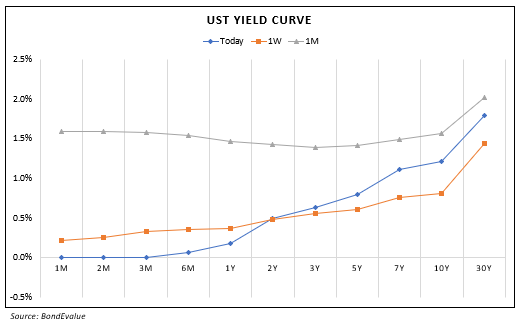This site uses cookies to provide you with a great user experience. By using BondbloX, you accept our use of cookies.
Bond Market News
HSBC, GM, Aramco Price $ Bonds
May 28, 2025

US Treasury yields held steady across the curve on Tuesday. The US Conference Board Consumer Confidence Index jumped to 98.0 in May, improving from the 85.7 reading seen in April. This was also higher than expectations of an 87.1 print. However, the preliminary reading for April’s Durable Goods Orders in the US fell 6.3% MoM, albeit better than expectations of a 7.8% drop. This came on the back of a 51% drop in commercial aircraft orders. Durable goods orders ex-transportation rose 0.2% MoM, slightly better than the surveyed 0.0%.
Looking at US equity markets, S&P and Nasdaq were higher by 2.1% and 2.5% respectively. Looking at credit markets, US IG and HY CDS spreads tightened by 3.6bp and 17bp respectively. European equity markets also closed higher. The iTraxx Main and Crossover CDS spreads tightened 3.2and 16bp respectively. Asian equity markets have opened mixed today. Asia ex-Japan IG CDS spreads tightened by 2.7bp.
New Bond Issues
- Shanghai Construction Group $ 3Y sustainability bond at 5.2% area

HSBC raised $1.25bn via a two tranche deal. It raised $900mn via a 3Y bond at a yield of 4.667%, 27bp inside initial guidance of T+100bp area. It also raised $350mn via a 3Y FRN at SOFR+97bp vs initial guidance of SOFR equivalent area. These senior unsecured bonds are rated A2/A-/A+. Proceeds will be used for general corporate purposes.
Aramco raised $5bn via a three tranche offering. It raised:
- $1.5bn via a 5Y bond at a yield of 4.883%, 35bp inside initial guidance of T+115bp area. The new bond was priced at a new issue premium of ~14bp over its existing 2.25% 2030 that currently yields 4.74%
- $1.25bn via a 10Y bond at a yield of 5.394%, 35bp inside initial guidance of T+130bp area. The new bond was priced at a new issue premium of ~28bp over its existing 4.75% sukuk due 2034 that currently yields 5.11%
- $2.25bn via a 30Y bond at a yield of 6.509%, 30bp inside initial guidance of T+185bp area
These senior unsecured bonds are rated Aa3/A+. Proceeds will be used for general corporate purposes.
GM Financial raised $2.25bn via a three-trancher. It raised:
- $500mn via a 2Y bond at a yield of 5.02%, 32.5bp inside initial guidance of T+137.5bp area. The new bond was priced at a new issue premium of 5bp over its existing 5.4% 2027 that currently yields 4.97%
- $1bn via a 5Y bond at a yield of 5.471%, 30bp inside initial guidance of T+175bp area.
- $750mn via a 10Y bond at a yield of 6.15%, 28bp inside initial guidance of T+200bp area
These senior unsecured bonds are rated Baa2/BBB/BBB. Proceeds will be used for general corporate purposes.
Commerzbank raised €750mn via a PerpNC8 AT1 bond at a yield of 6.625%, 63.5bp inside initial guidance of 7.25% area. The junior subordinated note is rated Ba2/BB, and received orders of over €7.6bn, 10x issue size. If not called before 9 April 2033, the coupon refixes every five years to the 5Y Mid-Swap plus 423.5bp. A trigger event would occur if the consolidated or individual CET1 ratio falls below 5.125%.
AXA raised €2bn via a two-tranche offering. It raised €1bn via a PerpNC5.5 RT1 bond at a yield of 5.75%, 62.5bp inside initial guidance of 6.375% area. The junior subordinated note is rated Baa1/BBB+. If not called before 2 December 2030, the coupon will reset to the 5Y Mid-Swap plus 359.9bp. There is no coupon step-up. It also raised €1bn via a 30.1NC10.1 Tier 2 bond at a yield of 4.416%, 35bp inside initial guidance of MS+225bp area. The subordinated note is rated A2/A-. Proceeds from both notes will be used for general corporate purposes including the refinancing of part of the AXA Group’s outstanding debt.
TD Bank raised $2bn via a three tranche deal. It raised:
- $1bn via a 3Y bond at a yield of 4.574%, ~22.5bp inside initial guidance of T+85/90bp area
- $300mn via a 5Y FRN at SOFR+91bp, versus initial guidance of SOFR equivalent area
- $700mn via a 5Y bond at a yield of 4.808%, ~24.5bp inside initial guidance of T+100/105bp area
These senior unsecured bonds are rated A2/A-/AA-. Proceeds will be used for general corporate purposes.
Rating Changes
-
Moody’s Ratings upgrades Volcan’s CFR to B3; stable outlook
-
Banco Industrial And Banco G&TC Upgraded To ‘BB+’ On Same Sovereign Action And BICRA Anchor Revision; Outlook Stable
-
Panama Canal Railway Co. Upgraded To ‘BBB-‘ From ‘BB-‘ On Acquisition By Maersk; Ratings Withdrawn At Issuer’s Request
-
Moody’s Ratings downgrades SIG plc’s corporate family rating to B3 from B2; outlook stable
-
Moody’s Ratings changes outlook to stable from negative on Hong Kong SAR, China’s rating; affirms Aa3
Term of the Day: Widow-Maker Trade
A widow-maker trade is considered to be a particular trade that repeatedly surprises markets and defies historical patterns, thereby resulting in large losses. These trades are typically considered rational and sometimes even the most obvious as patterns like mean-reversion or consensus views may seem the most likely outcome. However, the actual market moves turn out to be completely opposite to what is expected and thus causes big losses, making “widows” of traders.
One of the most popular widow-maker trades known to market participants is that of shorting Japanese government bonds (JGBs). Several traders have shorted JGBs over the past decades given the massive rise in Japanese government debt, very loose monetary policy and expectations of a eventual pick-up in inflation. As with widow-maker trades, this trade would logically seem to make sense. However, the BOJ only pushed interest rates lower kept policy broadly loose until recently. Due to its pressure on interest rates over the past decade, JGB prices moved higher causing losses to many traders.
Talking Heads
On Sudden Unravelling of Asia’s $7.5 Trillion Bet on US Assets
Virginie Maisonneuve, Allianz Global Investors
“We are in a shifting world order and I do not believe that we will go back to the state of things as we had before… It is an evolution from the World War Two order and is partially triggered by China rivaling the US”
David Gibson-Moore, Gulf Analytica
“The Global Financial Crisis of 2008 was a major wake-up call… sovereign wealth funds, family offices and institutional investors across Asia have gradually been rebalancing their portfolios to reduce overexposure to US assets.”
Rajeev De Mello, GAMA Asset
“Markets are at an inflection point, witnessing the birth pains of a new regime in finance… The Taiwan dollar episode is not an isolated event — it was a wake-up call for markets. The question now is: who’s next?”
On ‘Widow Maker’ Bond-ETF Trade Deliver Fast Gains for Dip Buyers
Athanasios Psarofagis, Bloomberg Intelligence
“Investors aren’t letting TLT’s widow-maker reputation scare them off… They’re still buying in, holding on to hope that long-term Treasuries will finally bounce back”
Peter Tchir, Academy Securities
“The situation wasn’t as bad as the narrative…Positioning had swung from too bullish to too bearish fairly quickly, too”
Lindsay Rosner, Goldman Sachs Asset Management
“We believe the long end will continue to see term premium increase… It’s all about the fiscal, what is the right level to lend at to countries whose balance sheets are trending the way they are.”
On IMF Warning UK to Keep Their Budget in Check
Luc Eyraud, IMF’s UK mission chief
“One of the elements why there is intense focus on headroom is because headroom is not very high… One of the recommendations we make is to have only one assessment of the rules at the time of the single fiscal event. That’s something we see in other countries.”
Top Gainers and Losers- 28-May-25*

Go back to Latest bond Market News
Related Posts:








